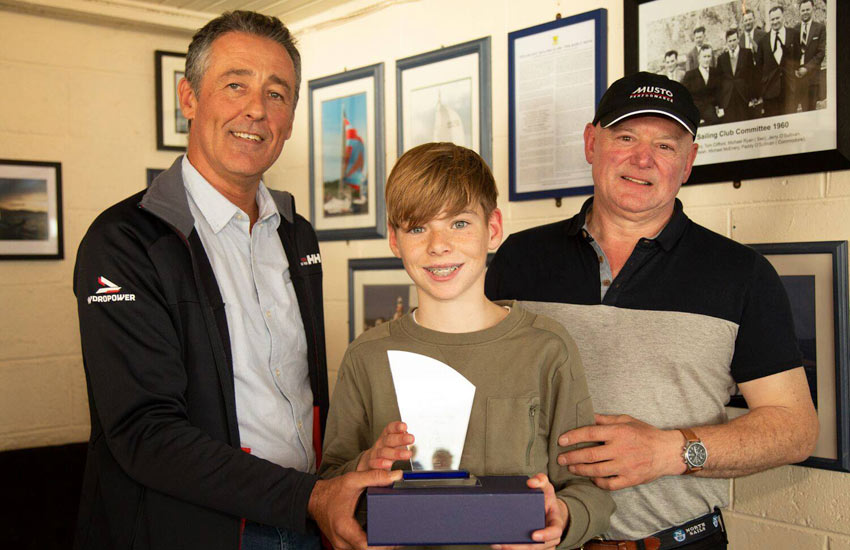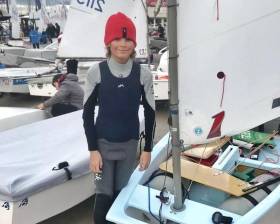Displaying items by tag: Rocco Wright
Howth Yacht Club’s Rocco Wright continues his outstanding run of form at the Trofeo Euromarina Optimist in Torrevieja, going into the penultimate day in second place overall.
The winner of the Seaward Bell Trophy in last week’s HYC Achievers Awards placed first in his first and fourth qualifiers in the Red group, with a second-place finish in the third and a black flag for race number two.
In the current tally (as of Friday 25 January) that puts Wright just one net point behind table-topper Marco Gradoni from Italy, and three ahead of Spanish youth Jaime Ayarza Montenegro.
Five other Irish juniors are competing in the south-eastern Spanish Mediterranean port this week, with James Dwyer Matthews (Kinsale YC) closest in 11th overall.
Ben O’Shaughnessy (Royal Cork YC), Clementine Van (National YC), Jessica Riordan (Royal St George YC) and Lucia Cullen (RStG/NYC) make up the rest of the Irish Optimist contingent.
Howth Sailors Top 2018 Oppy Rankings After Strong Season Finish On Tralee Bay
#Optimist - Howth Yacht Club have congratulated youth members Luke Turvey and Rocco Wright for topping the senior and junior tables respectively in the final 2018 rankings in Ireland’s Optimist class.
Turvey is in fine company in the senior fleet, ahead of Justin Lucas; James Dwyer-Matthews; Rian Geraghty-McDonnell, Ireland’s top performer at last week’s Oppy Worlds in Cyprus; and Sam Ledoux, who beat him on count back to win the senior Gold fleet at the IODAI Munster Championships last weekend.
Fellow Howth and NYC youth Wright, meanwhile, sailed a solid event with five bullets at Tralee Bay Sailing Club in Fenit, which saw a tough weekend of shifty conditions.
And in another win for Howth, the Fair Sailing Award went to Johnny Flynn.
 Luke Turvey was second overall in the Senior fleet | Photo: Paul-Michel Ledoux
Luke Turvey was second overall in the Senior fleet | Photo: Paul-Michel Ledoux
2018 IODAI Munster Championships Results
Junior Fleet Gold
- 1st Rocco Wright HYC
- 2nd Jessica Riordan RStGYC
- 3rd Ben O’Shaughnessy RCYC
- 4th Billy Doyle TBSC
- 5th Peter Williams RStGYC
Junior Fleet Girls
- 1st Jessica Riordan RStGYC
- 2nd Alana Twomey RCYC/CHSC
- 3rd Clementine van Steenberge NYC
Junior Fleet Silver
- 1st Sorcha Gannon O’Connor HYC
- 2nd William Walsh TBSC
- 3rd Conall Mac Thrinfhir TBSC
- 4th Harry Moynan RCYC
- 5th Hugo Crawford HYC
Top Local Sailor – Junior Fleet
- Billy Doyle TBSC
Senior Fleet Gold
- 1st Sam Ledoux NYC
- 2nd Luke Turvey HYC
- 3rd James Dwyer Matthews RCYC
- 4th Fiachra McDonnell NYC
- 5th Trevor Bolger RStGYC
Senior Fleet Girls
- 1st Eimer McMorrow-Moriarty TBSC
- 2nd Lauren O’Callaghan NYC
- 3rd Grace Fahy RStGYC/LDYC
Senior Fleet Silver
- 1st Liam Duggan RCYC
- 2nd Fleet Ciara Paul MYC
- 3rd Clodagh Malone NYC
Top Local Sailor – Senior Fleet
- Eimer McMorrow-Moriarty TBSC






























































